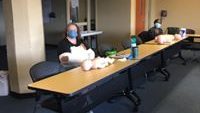As the COVID-19 pandemic spread, it turned our lives upside down. Fortunately, our Therapeutic Foster Care team adjusted so the foster care services they offer won’t suffer.
From virtual meetings to more flexible training, the team maintained services, and improved them in some instances.
“We have the ability to be more flexible with our trainings as they are able to be offered virtually,” said Julie Stewart, Adult & Child Health’s Director of Child Welfare Services. “This has given us the opportunity to review our training schedule and see where we might be able to make some additions and/or adjustments with trainings that are being offered.”
Here’s a look at the services that remain available, some new resources and how the team changed some foster care services:
Foster care services virtual meetings
“We continue to provide our full spectrum of services,” said Lynn Farmer, Community Outreach Development Specialist. “From licensing new homes, to maintaining certification/license, to providing the clinical/support services determined necessary.”
The virtual trainings will be more convenient for foster families, even in a post-COVID world.
“We are offering more trainings online, making it easier for parents to attend,” Farmer said. “We have also started offering an online version of CPR/First Aid (pictured above). This allows parents to take the classroom portion of the training online, and then they only need to be tested on the physical maneuvers (chest compressions).”
Virtual training and service provision is new to most, but it offered unforeseen benefits, according to at least one Therapeutic Foster Care team member. Dakota Reynolds, Therapeutic Care Specialist, said some youth and parents could focus more during the sessions together. She also enjoyed sharing a more personal side of herself with clients by introducing them to the pets she has in her home.
What’s new?
The team recently set up a virtual support group for foster parents. They offer the meetings multiple times during the day to try to gauge what fits best into people’s schedules.
Therapeutic Foster Care also can allow foster parents to assist directly with virtual supervised visitations with biological family members. That assists in building bridges for youth.
“Having the opportunity to provide services virtually has allowed us to figure out creative ways to make connections that might otherwise be difficult due to scheduling/location of siblings and/or biological families,” Stewart said.
In addition, the foster care services licensing process has become more virtual out of necessity. “We have the ability to send forms electronically and can also drop off/pick up paperwork through ‘no contact’ methods,” Stewart said.
COVID-19 specific foster care services resources
In addition to this one-stop shop of resources, the team offered this frequently asked questions list for foster parents to utilize. Among the examples:
Q: “What if someone in the household has a fever? If they have no known connection to the coronavirus, is a fever alone enough to stop visits?
A. You should notify Adult & Child Health and the Indiana Department of Child Services (DCS) immediately. Any individual with a fever should be treated as if they are potentially positive for COVID-19, and quarantined until fever-free for 48 hours. Continuously monitor the person’s condition. If symptoms worsen, seek medical assistance as previously outlined.
Stewart said the team will treat COVID-19 cases in foster homes on a case-by-case basis.
“We are working with our foster parents to help them come up with individualized plans about how to help them in this case,” she said. “For example, if a foster parent contracts the virus and becomes too ill to care for the child, we work with them to develop a child care plan to ensure that the youth’s need will continue to be met.”
Whether a family member contracts COVID-19 or not, Farmer emphasized self-care during the current stressful environment.
“As the stressors mount, from isolation, home schooling, work/financial pressures, it is imperative that foster parents take care of themselves,” he said. “We recently started a virtual support group that meets at 11 a.m. and 5 p.m. every other Tuesday.”
Want to learn more about becoming foster parent through our Therapeutic Foster Care program? Learn the basics, call 317-893-0207 or email Lynn Farmer.






